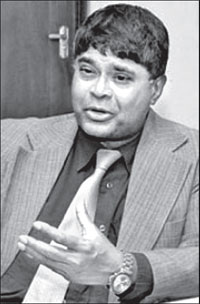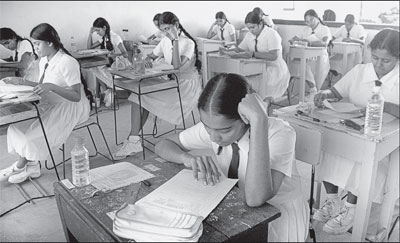|
Future of free education in Sri Lanka:
Politicizing education, FUTA’s trade union action
Prof. Rajiva Wijesinha, MP
Uniquely as far as the developing world goes, and pretty much as far
as the whole world too, Sri Lanka does not in theory permit private
education. There are a few official exceptions that we all know about,
namely a few private schools that are immensely popular. Then there are
official exceptions in the form of paid postgraduate and diploma
programmes which the universities run, and which continue to function
with input from separately paid FUTA members even while the strike for
undergraduate courses continues.
|

Prof. Rajiva Wijesinha, MP |
Then we have unofficial paid education, in the form firstly of what
are termed International Schools, some preparing students for
international examinations, others for Sri Lankan exams in English
medium. The whole country is dotted with such schools, and they have in
fact a very efficient organization that prepares good textbooks, or
procures them from international, mainly Indian, publishers. Secondly
there are branches of a number of foreign universities, usually ones not
well known in their countries of origin, though there are some
exceptions. These prepare students for foreign degrees, and most can now
cover the full course here, though in some cases students go abroad for
one or more years.
Finally, most lucrative of all, we have tuition, which many students
now consider essential to get through public examinations. In many
cases, tuition is given in large tutories, in several of which serving
teachers are stakeholders, and where they often teach. Sometimes tuition
is arranged privately, often for teachers who explain to their students
that such supplementation is necessary.
Checking with my students at university, I would find that, with one
or two exceptions, all had gone for tuition. The idea that education was
free was not something that they took seriously in their struggle to get
into university. This is perhaps understandable, since when supply does
not equal demand, then inevitably there will be alternative sources of
supply. Ironically, those who argue vociferously that, to preserve free
education, formal institutions supplying education at a price should be
banned, pay no attention to the tuition industry which not only makes
enormous amounts of money nationwide but is also deeply parasitic upon
the free state system, in that those supposed to benefit from that
system are providers as well as recipients.
Academic autonomy
I do not think that hypocrisy is necessarily involved in the
programmes of protest that we see. Rather, this selectivity is a
necessary feature of what is a politicized process, so that those
opposed to government must take what advantages they can, when they know
that government personnel also take advantage of the system. Though in
theory state institutions are independent, we know that many decisions,
from the appointment of Vice-Chancellors to selection of students to
prestigious schools, are made by politicians. It is inevitable therefore
that, when they see a chance to make political capital, both politicians
and intellectuals opposed to government will take their chance.
Sadly, their answer to current problems is simply more statism. They
believe that, somewhere in an idyllic future, there exists the
possibility of academic autonomy within a totally statist system. The
fact that over fifty years the politicization of education has got worse
must surely indicate to anyone with a scientific turn of mind, and a
regard for inductive reasoning, that the answer should be a reduction of
the role of the state. But so entrenched are prejudices, along with the
recognition of advantages that can be obtained, that radical change
seems anathema to all.
International Schools
I mentioned a period of 50 years because it was then that the rot
really began, with the takeover of schools nationwide. I suppose that
was understandable in a context in which the Catholic Church seemed
involved in anti-governmental activity, but the remedy proved disastrous
- and it is no secret that all major political figures since then have
sent their children to the few private schools that remained, or to the
international schools that sprang up in the eighties.
The universities followed suit under Minister Iriyagolle in the next
government, and this was followed by the aggressively centralizing
approach of the United Front government of 1970, which created a single
university. Though the Jayewardene government that succeeded claimed to
restore autonomy, it continued to control, a factor that was masked by
the capabilities of a couple of Vice-Chancellors of the time, notably
those in Colombo and Moratuwa. Trusted as they were, they were permitted
a free rein. But there was no effort to introduce the reforms needed if
the new universities that were established were to produce graduates
suited to the new economic opportunities that were emerging.
The Premadasa regime, and its dynamic UGC chairman, did try to change
things, through the Affiliated University Colleges, and promotion of
modernizing units such as the Sri Jayewardeneputa Management Faculty,
but President Wijetunge soon put paid to that, sacking the Chairman over
a personal matter. Unfortunately the Kumaratunga government did not stop
to think, and converted the AUCs into traditional universities, where
they have suffered since then as pale shadows of institutions they
cannot emulate. Meanwhile, as was most obvious in Peradeniya, the type
of witchhunt the Jayewardene regime had engaged in, was imitated, though
less thoroughly, given the less ruthless - or perhaps less competent -
approach of its perpetrators.
School education system
So, despite some excellent ideas that emerged from the Task Force
President Kumaratunga set up, little was done to reform the system. Good
ideas were grafted onto a moribund system. By the time government
realized that it needed radical change, it was too late. Tara de Mel was
Secretary to the Ministry all too briefly on two occasions, and the
second time her hands were tied by the President foolishly taking her
away on tsunami work.
Typically, following the change of government in 2005, it was assumed
that whatever Tara had done should be undone, and we therefore had five
years of reversion to type. However, with a revitalized government in
2010, the need for reform was obvious, and the Ministry of Higher
Education did try to introduce some changes. I should note here my
continuing regard for the Minister and the Secretary who have had the
courage to point out the need for reform. Though action could have been
swifter, and more consultation should have taken place, they did try,
and it would be a tragedy if this opportunity for reform passed the
country by. Conversely, though there were efforts to reform the school
education system, continuing lethargy at the Ministry seems to have
overcome the intention of the Minister, way back in 2010, to introduce a
new Act. This was intended to make clear the need for greater
responsibility in the system, and greater accountability based on
individual schools, but naturally those who now wield immense power in
the ministry seem to have sidetracked the effort.
|

Education, the right of every child |
More excuses
So things have now come to a head, with opponents of the government
scenting blood and determined to push protest to its limits. Aided by a
series of blunders, not so much with regard to decisions as to failure
to explain matters rationally and precisely, FUTA has now announced a
strike that is clearly political in intention.
Though there are claims for enhanced salaries, this has paled before
the assertion that government must commit 6 percent of GDP to education
before work is resumed. So undergraduates continue to suffer - something
they are used to, given the range of mechanisms used to stop work,
student strikes, academic strikes, non-academic strikes, working to rule
and of course ragging - and courses that are in any case longer than
they should be, four years for what should be done in three, given the
intensity of our Advanced Level syllabuses, now drag on for longer.
To be continued |





